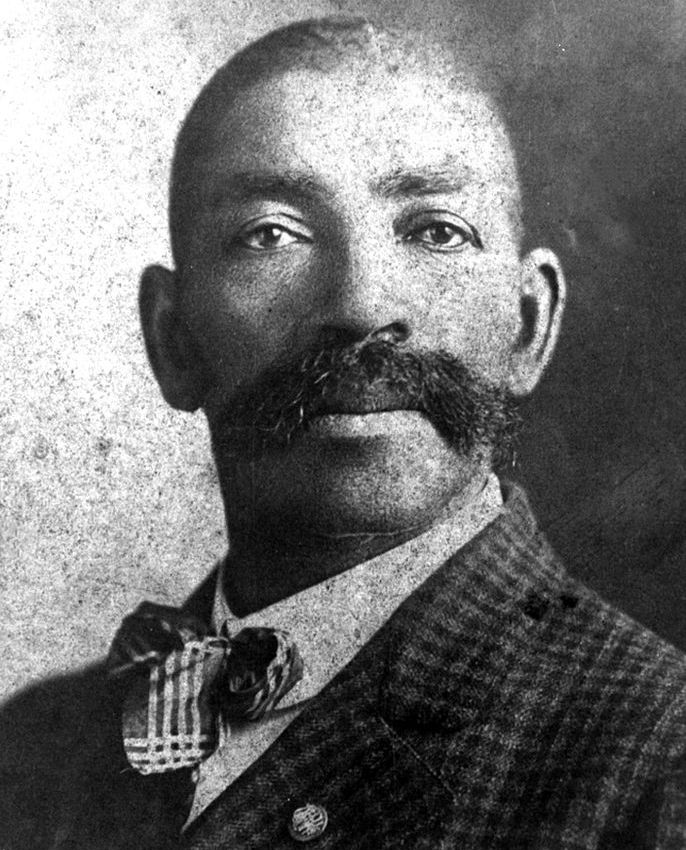His name was Bass Reeves. He was an African-American who did, in fact, live among Native Americans. He became a deputy U.S. Marshal, a lawman who hunted bad men. He was accompanied by a Native American, riding on a white horse, and he had a “silver” trademark. And he was the inspiration for the legendary Lone Ranger.
Historians have largely forgotten many aspects of the real Lone Ranger, his ethnicity being the major thing kept out of the legend. Even historians of the American West have conveniently forgotten that the man who inspired the legendary Lone Ranger was a free black man.
The exceptions are Vaunda Michaux Nelson, whose book “Bad News for Outlaws: The Remarkable Life of Bass Reeves, Deputy U.S. Marshal,” won the 2010 Coretta Scott King Award for best author. Arthur Burton also released an overview of the man’s life a few years ago. “Black Gun, Silver Star: The Life and Legend of Frontier Marshal Bass Reeves.”
It was Burton who recounted the life of a black man who headed West to find himself a better life than the one into which he had been born in 1838. Reeves had been born into slavery. His “owner,” or rather his slave-keeper, took Reeves with him as a personal servant when he joined the Confederate Army. During the chaos that ensued, Reeves found the opportunity to free himself. He beat his “master” within an inch of his life and then bravely escaped the bonds of slavery, fleeing to Oklahoma. There, he lived peacefully among the Seminole and Creek Nations of Native American Indians.
Once the Civil War had concluded, Reeves was officially and legally a free man. He married, fathered 10 children and found his livelihood as a U.S. Deputy Marshal in Arkansas and the Indian Territory. Reeves was the first African-American to ever hold such a position.
Burton explains that it was at this point that the Lone Ranger legend began. Reeves was described as a “master of disguises.” He went undercover, using disguises to track down wanted criminals. He dressed and behaved like them so he could meet, fit-in and identify fugitives.
Reeves gave out silver coins as a personal trademark of sorts, just like the Lone Ranger’s silver bullets. Of course, the recent Disney adaptation of the Lone Ranger devised a clever and meaningful explanation for the silver bullets in the classic tales. For the new Lone Ranger, the purposes was to not wantonly expend ammunition and in so doing devalue human life. But in the original series, there was never an explanation given, as this was simply something originally adapted from Reeves’ personal life and trademarking of himself.
For Reeves, it had a very different meaning, he would give out the valuable coins to ingratiate himself to the people wherever he found himself working, collecting bounties. In this way, a visit from the real “Lone Ranger” meant only good fortune for the town: a criminal off the street and perhaps a lucky silver coin.
And what of “Tonto?” Like the famed Lone Ranger, Reeves also had his own close friend like Tonto. Reeves’ companion was a Native American tracker, which made him an ideal posse man. Reeves often rode with his posse man companion when out capturing bad guys. Together, they apprehended some 3,000 criminals, making them a legendary duo in many regions.
How do we know Reeves was really the inspiration behind the mask? Well, a large number of the criminals caught were sent to federal prison in Detroit. The Lone Ranger radio show originated and was broadcast to the public in 1933 on WXYZ in Detroit, where the legend of Reeves was famous only two years earlier.
Naturally, WXYZ and the later Hollywood wasn’t about to make the Lone Ranger an African-American who began his career by beating a slave-keeper.
Now you know who the real Lone Ranger was, and, it is very fitting that you learned this during Black History Month.













Looks like “Django Unchained” has hints of Reeves in it as well.
A similar thought crossed my mind as I researched and wrote this article. Thank you for your comment and for reading us here on Scenesmedia.com.
See one problem here on facts.
“He beat his “master” within an inch of his life and then bravely escaped the bonds of slavery, fleeing to Oklahoma”
Then you say.
“Hollywood wasn’t about to make the Lone Ranger an African-American who began his career by beating a slave-keeper to death”
So what was it? Did he kill him or damn near? Either way it can not have been both either was the owner was dead or injured very bad.
I saw that too.
See comment below. Thank you for your comment and for reading us here at Scenesmedia.com.
Robin Russell
Hi Chris, Please see my comment below. And thank you very much for your comment and arousing such discussion. I love that! And thank you for reading me here at ScenesMedia.com. I greatly appreciate it, even if you have a problem with my article, which I will try to clarify — based on your comment.
Robin Russell
That’s what you focused on, in 1933 it really didn’t matter if he damn near or did kill him for a slave the punishment would have been the same if caught…DEATH, soooo…REALLY! Hollywood wasn’t going to make a hero out of ANYONE with dark skin…not even JESUS!
Sandy54, thank you for getting it and for your comment. While technically Chris and Eddie are correct, I simply took your stance. To have “damn near beat his master within an inch of his life” was to have done it in the eyes of society, and, certainly, Hollywood, in 1933. He was labeled, so to speak, as a “master killer.”
But Chris and Eddie have a point (even though they seem to making the wrong point). While pointing out my so-called error, they failed to understand the more serious implication which you seem to readily understand. He didn’t kill his master. He beat his master within an inch of his life. However, he was forever-after described as a “master killer” or a killer of slave masters. The unfairness of the description is horrifying. And having been thusly charged and forever labeled, it’s a wonder he managed to become a effective lawman at all. It adds to his overall achievements and places before us a man of great determination and character.
With a nod to Chris and Eddie, though, I’ll admit…… Perhaps I should have explained the situation more clearly. I shall attempt to correct the article when time permits.
Let’s not forget, however, the point of the article, please. The real Lone Ranger was black. I still find that historic point utterly astounding and wonderful.
This is an amazing true story. He may have forced himself to be freeman. That itself is heroic, but he did not stop there. He continued as a hero indeed, as Lone Ranger. Set the race aside, this man did not want to be seen as a hero, but people made him a hero. We all did, even with a white face on cinema or with African face, did not make any difference Lone Ranger is a Hero. Perhaps it takes to races to create a real hero. This is just my opinion.
Bravo mr.wolf and well-said. The utter courage and fortitude this man showed in escaping the bonds of slavery should have been enough to cause the country to respect and revere him. But, as you mentioned, he went further by becoming not only a law-abiding citizen, but a lawman too. A lawman whose exploits and tenacity that not only transcended his former life as a slave, but reached the echelons of a All-American hero. He fought against the injustices of his world, beginning with escaping the chains that literally bound him as human life-stock.
It is regretful that contemporaries of his day couldn’t or wouldn’t see past the color of his skin. Perhaps in the future, Hollywood will tell Bass Reeves’ true story. The man has earned that, to say the least.
Thank you very much for your comments.
Robin Russell
Ms. Robin Russell,
Thank you so very much for bringing this fact to light, there are so, so many things I’m
learning that we Black people do not know, that Black people have done that benefit
America. To me we are the real Americans, our native culture was beaten out of us and
we were indoctrinated with what America wanted us to know and believe for over 400
years, and during those 400 years more and more things are coming to the light of day
we have done to make America a better safer place to live, even tho we were being
treated way way worse than unfairly.
Thank you again,
Ken Johnson
This is an amazing true story. He may have forced himself to be freeman. That itself is heroic, but he did not stop there. He continued as a hero indeed, as Lone Ranger. Set the race aside, this man did not want to be seen as a hero, but people made him a hero. We all did, even with a white face on cinema or with African face, did not make any difference Lone Ranger is a Hero. Perhaps it takes two races to create a real hero. This is just my opinion.
Thanks for sharing this story. I enjoyed watching the Lone Ranger on TV with my Dad when I was a girl. That was one of his favorites. He would have been amazed to know the real Lone Ranger was African American.
There are other sources that would say Marshal Bass Reeves was not the Lone Ranger, but appears only by coincidence. Marshal Reeves has a great history, but how do you say he was the Lone Ranger without specific facts vs speculations? You reference Burton’s book, however I read that Burton only speculated it was him, and never said it was Reeves…
That is a myth. Read this:
https://popmyths1.blogspot.com/2020/03/myth-debunked-bass-reeves-is-not-lone.html
Robin, you are a great writer, but you didn’t do enough research. You tell the story about Reeves’ life but you don’t talk about the Lone Ranger and how he was actually created. And you didn’t interview any one who knows the history of the Lone Ranger. This Reeves myth has no facts to make it true. It is all speculation. You reference Art Burton’s book, however Burton only speculated a connection, and he never said it was actually true. Read the article I posted. Have a great day.
@ John Marston
Your post debunking the myth is not what I would call conclusive; moreover, the “comparisons” between The Lone Ranger (the character) and Bass Reeves himself is nothing short of risible. That would be like Sir Arthur Conan Doyle comparing his creation, Sherlock Holmes, with the real life influential person upon which he is based, Dr Joseph Bell (Edinburgh University) like for like.
I couldn’t find any proof that Bass Reeves had any Native American tracker, who strangely your article does not name, or they often rode together. In fact Bass Reeves commanded hundreds of lawmen and they rode under him from time-to-time.
Yes if Lopez beat the slaveholder, it was probably to defend and save the life of the master’s slaves he was about to hang or beat down with a whip. You should see their backs after a beating.! Let’s hope he was dead or injured so he could not continue to beat his slaves and rape the young Black slave girls and slave women. You know most of them already had white blood they were born with from the master. It was not a pretty picture. The stories from the slave narratives are so sad how the women and girls were treated, raped and abused daily.